Water Treatment and Re-Use for “Near Zero-Discharge” Aquaculture Facilities
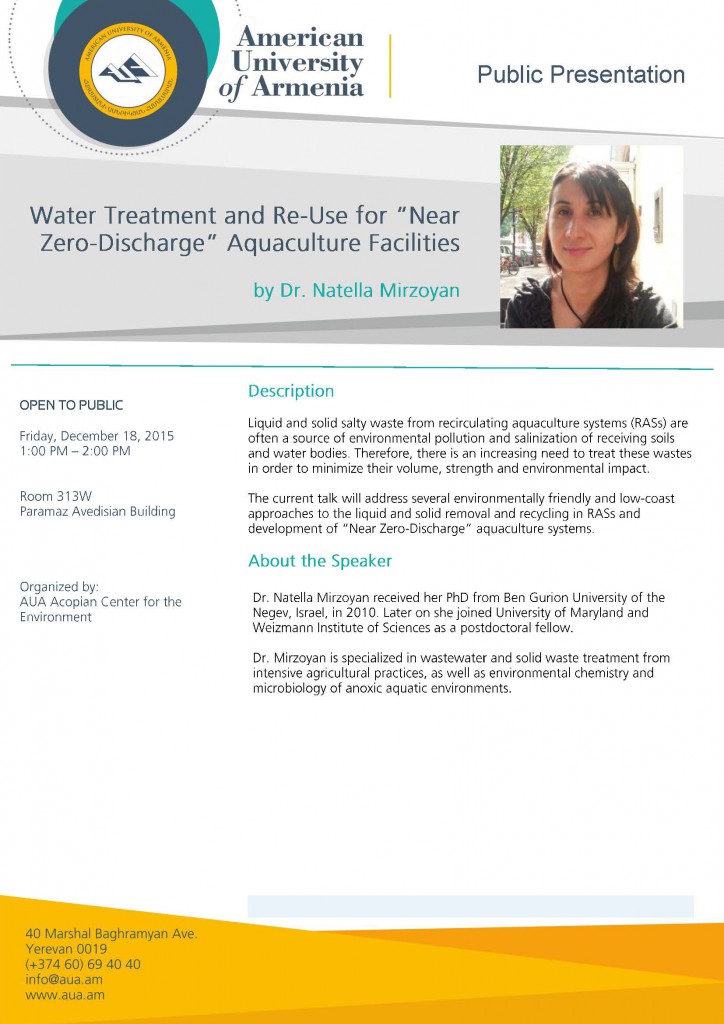
Linda Shahinian, a Native Angeleno, Contributes Her Talents to AUA’s Acopian Center for the Environment
AUA Acopian Center for the Environment Director Interviewed in Civilnet Reportage on Green Architecture.
AUA ACE’s “Edible” School Yards Program Being Piloted in Two Yerevan Schools
Two AUA Faculty Members Write a Textbook on Green Architecture
WORK STUDY ANNOUNCEMENT for the AUA Acopian Center for the Environment (AUA ACE)
2 Work Study Positions for GIS Database Development and Mapping of Red Book Species
AUA Acopian Center for the Environment (AUA ACE) is preparing GIS maps on natural resources and natural assets of Armenia, including the flora and fauna in Armenia’s Red Books. The Center is seeking a GIS work study student to assist with this mapping.
SCOPE OF WORK:
The student(s) shall:
- Complete geodatabase of Red Book of The Republic of Armenia (The Red Book of Plants, The Red Book of Animals)
- Create public maps of Red Book of The Republic of Armenia
- Deliver a final presentation on the final work
EXPECTED DELIVERABLE(S):
- GIS geodatabase of Red Book of RA
- Final public maps
QUALIFICATIONS
- Satisfactory performance in AUA undergraduate course CSE 145 Geographic Information Systems or equivalent
- Currently enrolled in Bachelor’s or Master’s programs at AUA
- Working knowledge of the Armenian and English languages
- Good academic standing
HOURS: 20 hours per week, with flexible schedule.
DURATION: 1 month with possible extension
COMPENSATION: AUA’s prevailing work study rate
HOW TO APPLY: All interested students should send their motivation letter, recommendation letter from AUA GIS faculty or staff, and CV to [email protected]. In the subject area of the email specify GIS Work Study Program.
APPLICATION DEADLINE: Monday, November 16, 16:00
FOR MORE INFORMATION CONTACT: Aghavni Harutyunyan, Phone: (+374) 60 61 26 93, E-mail: [email protected]
WORK STUDY ANNOUNCEMENT for the AUA Center for Responsible Mining (AUA CRM)
The Mining Legislation Reform Initiative (MLRI), a project of the AUA Center for Responsible Mining (AUA CRM), conducts analysis of Armenia’s laws and regulations in an effort to draft, propose, and ensure adoption of legislative and regulatory reforms that enables mining in Armenia to bring maximum benefit to the country outweighing its many costs. As a part of this effort, AUA CRM has established a work study program to integrate law students into MLRI’s work and mission. Participating students will work under the guidance of the AUA CRM director, MLRI manager and MLRI legislative analyst.
SCOPE OF WORK:
The student(s) shall:
- Support the team in conducting thematic research and analysis of existing laws, regulations and court decisions
- Gather statistics, data, and information relevant to legislative review and reforms
- As part of developing mining legislation watchdog capacity in Armenia, identify current draft mining laws and regulations that are in circulation and help set up public internet portal for making drafts and their timelines available to the public
- Provide technical support in data entry, short translations, proofreading, etc.
EXPECTED DELIVERABLE(S):
- Legislative briefs
- Research memos
- Legal data and information reports
QUALIFICATIONS
- Currently enrolled in graduate degree law programs in Armenian universities
- Excellent knowledge of the Armenian language
- Strong knowledge of the English language
- Demonstrated skills in legal research and writing
HOURS: 20 hours per week, with flexible schedule.
DURATION: 3-6 months with possible extension.
COMPENSATION: AUA’s prevailing work study rate
HOW TO APPLY: All interested students should send their motivation letter and CV to [email protected] and [email protected]. In the subject area of the email specify AUA CRM Work Study Program.
APPLICATION DEADLINE: 16:00, November 18, Wednesday.
FOR MORE INFORMATION CONTACT: Meri Galstyan, (+374) 60 612 776, [email protected]
Risk Assessment and Best Practices in Mine Waste Management
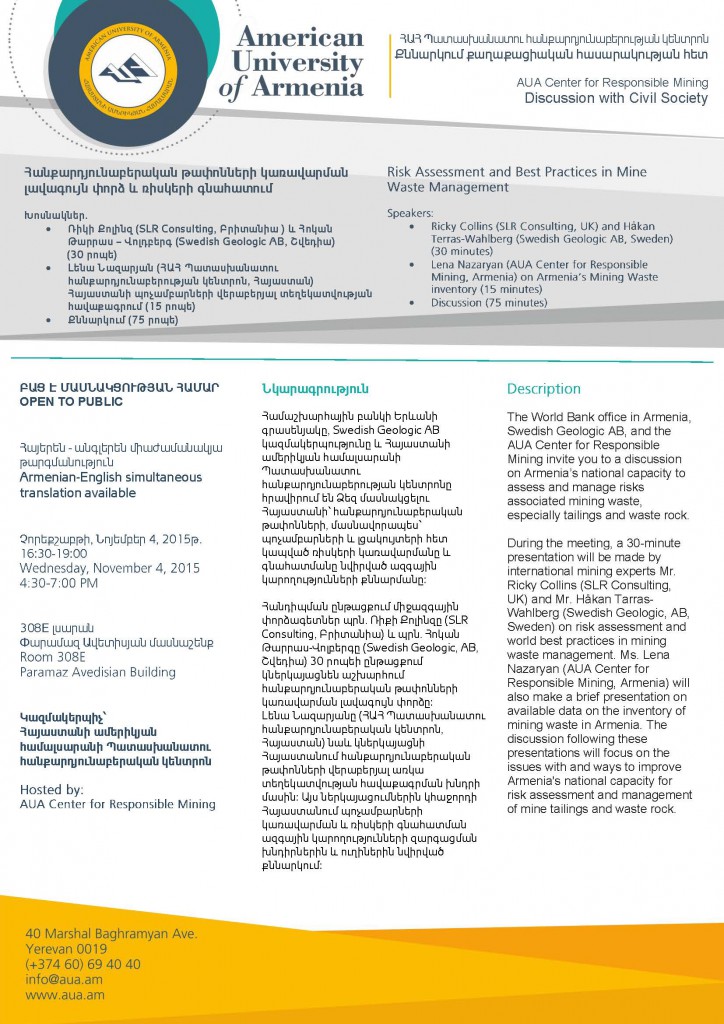
The Power of Partnerships: American Trends that Entrepreneurs around the World Can Use for Profit, People and the Planet
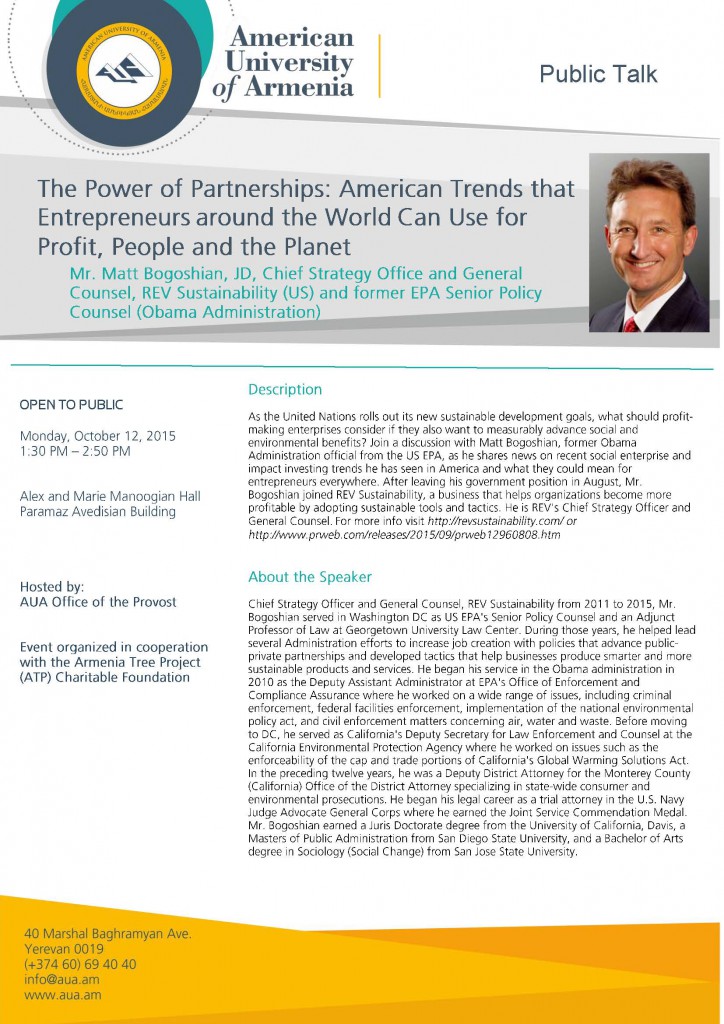
OZONE: All There Is between You and UV
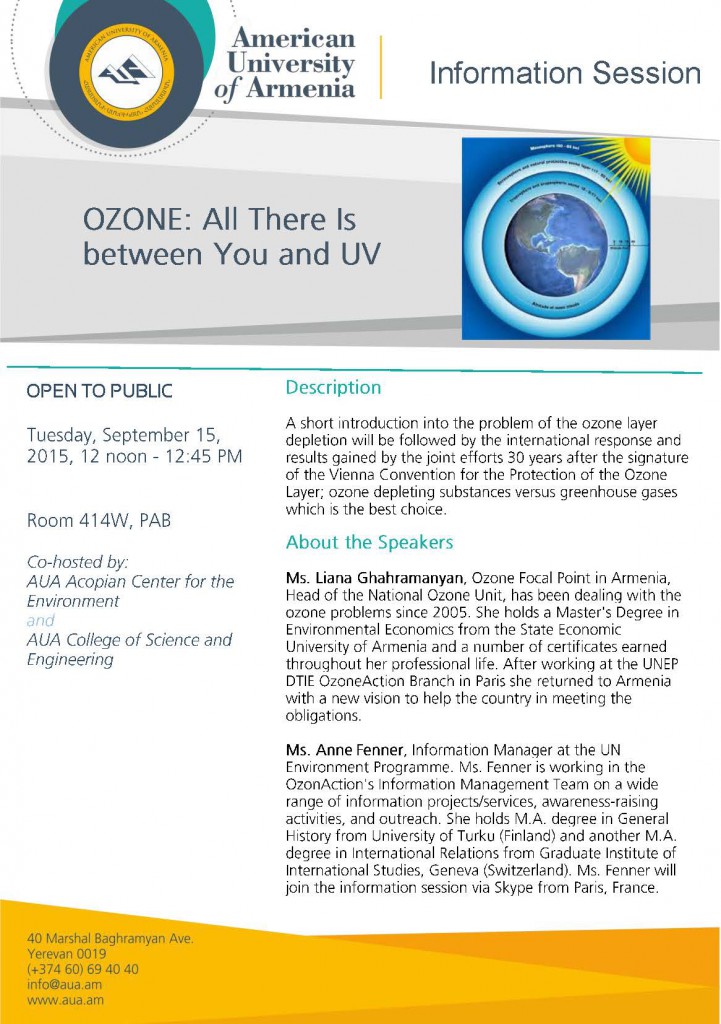
OZONE: All There Is between You and UV
Environmental Education Micro Project Competition, Deadline: October 8, 2015, 4pm
Environmental Education Micro Project Competition
The Power of Partnerships: American Trends that Entrepreneurs around the World Can Use for Profit, People and the Planet
National Study Tour in Armenia Organized by AUA ACE Featured in the TREC Danube
Armenia’s Tourism Competitiveness: Exploring Links with Natural Resources and Environmental Sustainability
Computational Design with Grasshopper, July 24-25, 2015, 11am-9pm
Computational Design with Grasshopper
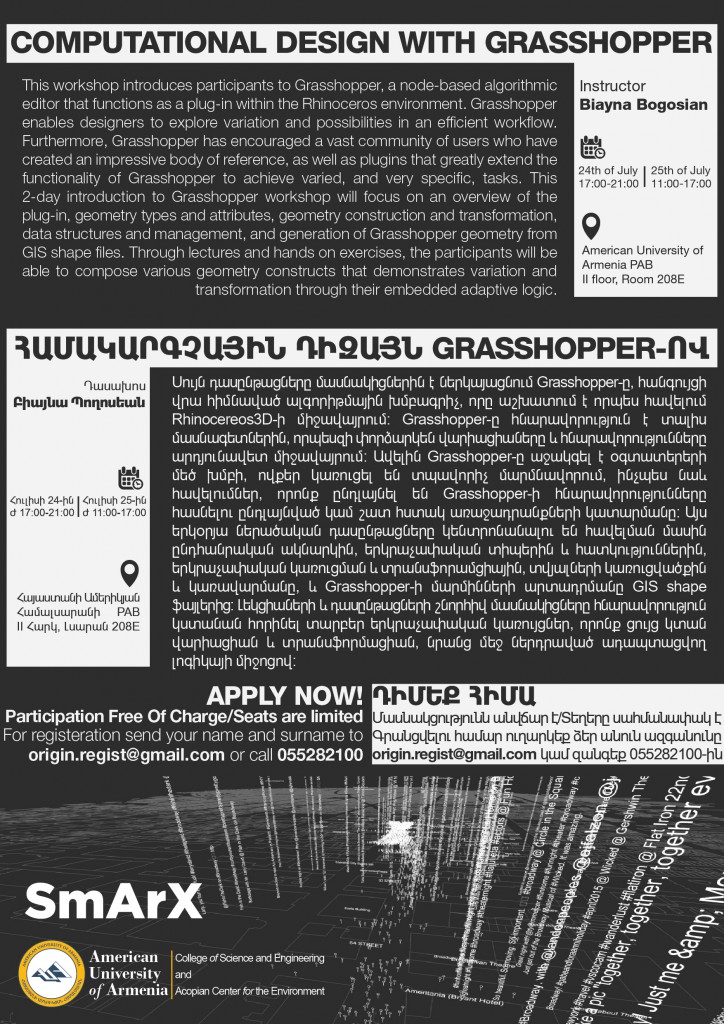
Designing with Data
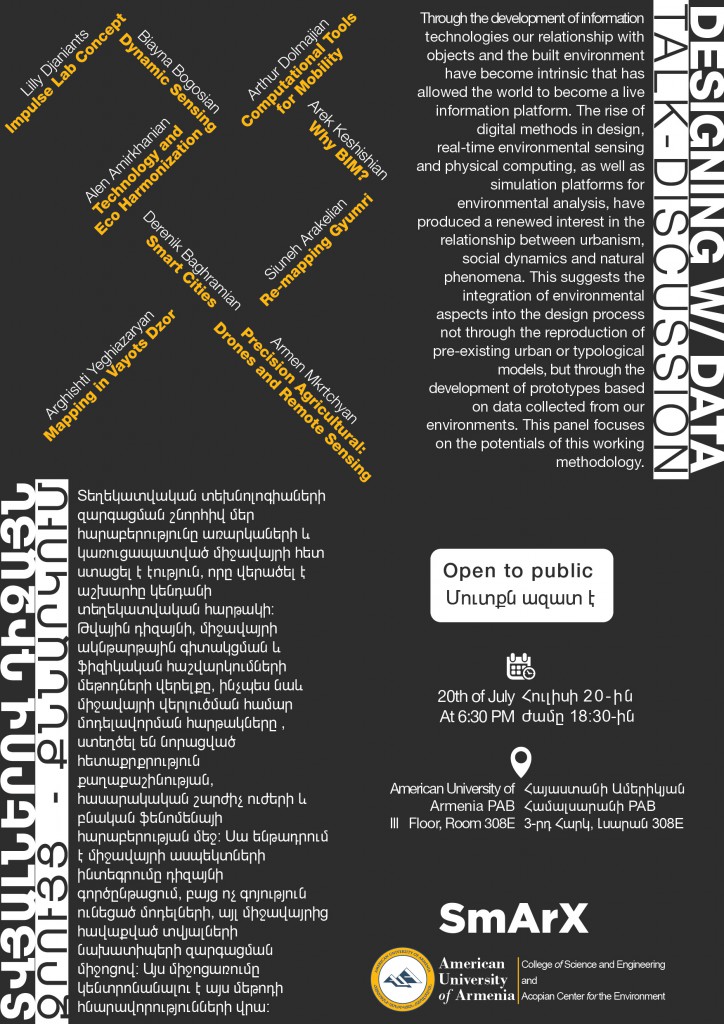
Designing with Data, July 20, 2015, 6:30pm-8:30pm
Six Yerevan Schools Complete AUA Acopian Center for the Environment’s “Natural Environment and I” Program
Environmental Internship Announcement – Summer 2015
ORGANIZATION: Environmental Law Resource Center of YSU Faculty of Law
POSITION TITLE: Intern
Inters are sought for each of the following activities:
1. Assist in development of a glossary of environmental legal terms, assist in schematic development of an online platform for public participation in environmental decision-making, including:
For glossary:
- Assistance in preliminary research;
- Assistance in elaboration of environmental-legal terms;
- Assistance in development of the structure and linking relevant sections.շ
- For the planned web-page (www.ecolex.am):
- Assistance in preliminary elaboration of the schematic map;
- Assistance in content development;
- Assistance in elaboration of non-technical solutions (ideas) for users and administrators in cooperation with IT specialists.
2. Assist in preparation of legal opinions on draft legal acts/legislation related to the environment:
- Assistance in checking up for new draft legal acts related to environment;
- Assistance in research of foreign experience as and if required;
- Assistance in elaboration of remarks and suggestions to the drafts;
- Participation in legal-team’s discussions.
The interns will get specific assignments on one of the topics above, based on their professional background and interests.
HOURS: Flexible schedule
REQUIREMENTS:
Applicants should:
- Be enrolled in Bachelor’s or Master’s programs at the American University of Armenia (AUA),
- Have good academic standing,
- Have interest in environmental law, and
- Be able to work under pressure, and handle multiple tasks.
COMPENSATION: Not paid.
HOW TO APPLY: All interested students should send their CV and a cover letter to [email protected] , mentioning Summer Internship at Environmental Law Resource Center of YSU Faculty of Law in the title field.
APPLICATION DEADLINE: 17:00, June 16, Tuesday.
FOR MORE INFORMATION CONTACT:
Heghine Hakhverdyan
Phone: (+374) 60 710237
Cell phone: (+374) 55 991419
E-mail: [email protected]
Six Yerevan Schools Complete “Natural Environment and I” Program, June 8, 2015
Study Tour on Energy Efficiency, Renewable Energy and Other Eco Solutions in Buildings in Armenia
2015 Summer Graduate Courses at AUA on GIS and Remote Sensing
ENV 320: Geographic Information Systems and Environmental Analysis (2 semester units)
Instructors: Hovik Sayadyan and Arthur Dolmajian
MWF, 18:00-21:00
June 1 – June 24, 2015
Prerequisites: None
NOTE: This course satisfies the AUA graduate degree environmental requirement
Course Description: The course aims to introduce and develop introductory and intermediate skills in application of Geographic Information Systems (GIS) to visualize, analyze, and interpret relationships, patterns and trends in the fields of environmental management, public health, sustainable agriculture and transportation. GIS as a tool, however, is applicable to a wide variety of fields and industries, including marketing, logistics, urban development, and so on. Students will also learn to use Global Positioning System (GPS) units to collect spatial data.
ENV 321: Remote Sensing and Environmental Analysis (1 semester unit)
Instructor: Patric Schlager
Saturday, 9:00 – 16:30
June 20 and July 4, 2015
Prerequisites: Completion or satisfactory progress in ENV 320
Course Description: The course aims to provide a basic understanding of land-use mapping with remote-sensing techniques. The focus will be on multispectral remote sensing and pixel based image classification. For land use mapping, freely available satellite data from the Landsat mission will be used. Processing will be done with ArcMap10 or similar software.
For more information about the course and registration please contact us by phoning at 060 61 25 20 or 060 61 26 38 or visit AUA Registrar’s office.
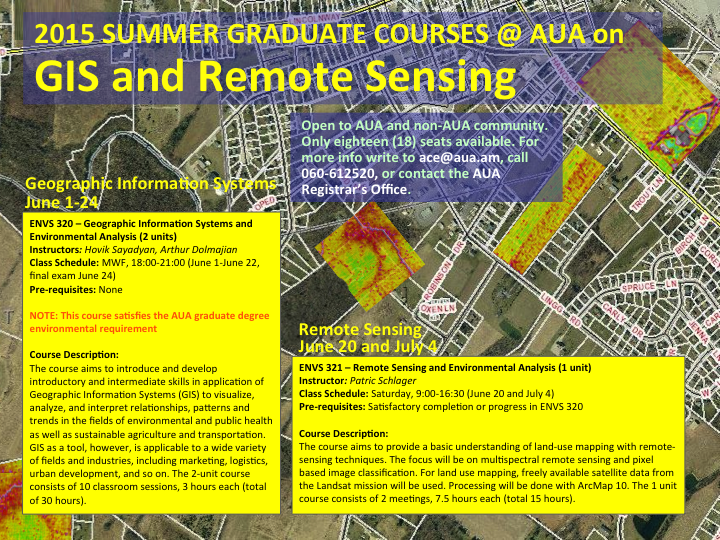
2015 Summer Graduate Courses at AUA on GIS and Remote Sensing
Animal Welfare Training co-hosted by AUA Acopian Center for the Environment
AUA Acopian Center for the Environment Hosts Director of Yerevan Zoo
AUA Hosts Speaker on U.S. Innovation & Policy for Clean & Renewable Energy
AUA Acopian Center for the Environment Hosts Lecture on Social Innovation, Alternatives, and Change
Roundtable Discussion at AUA Brings Attention to the Future of Inclusive and Resilient Schools in Armenia
Training on Photovoltaic & Solar Thermal Collector Installation
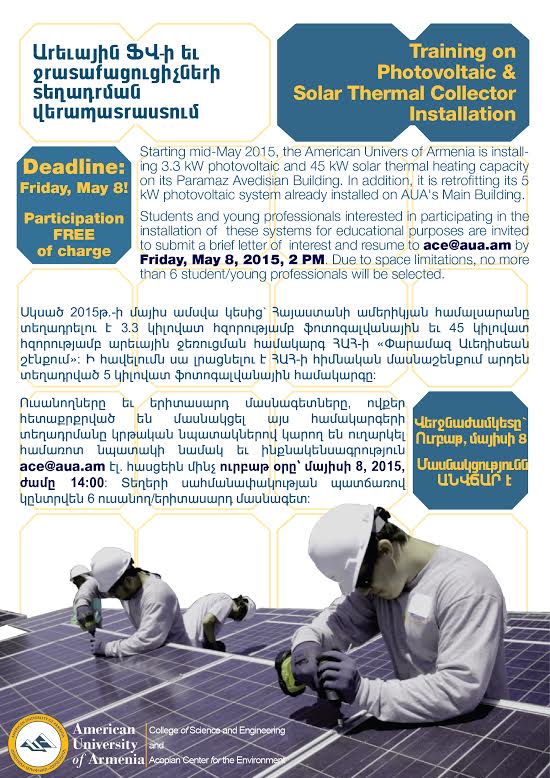
Training on Photovoltaic & Solar Thermal Collector Installation, Application Deadline – May 8, 2015
Digital and Virtual Platforms for Environmental Education
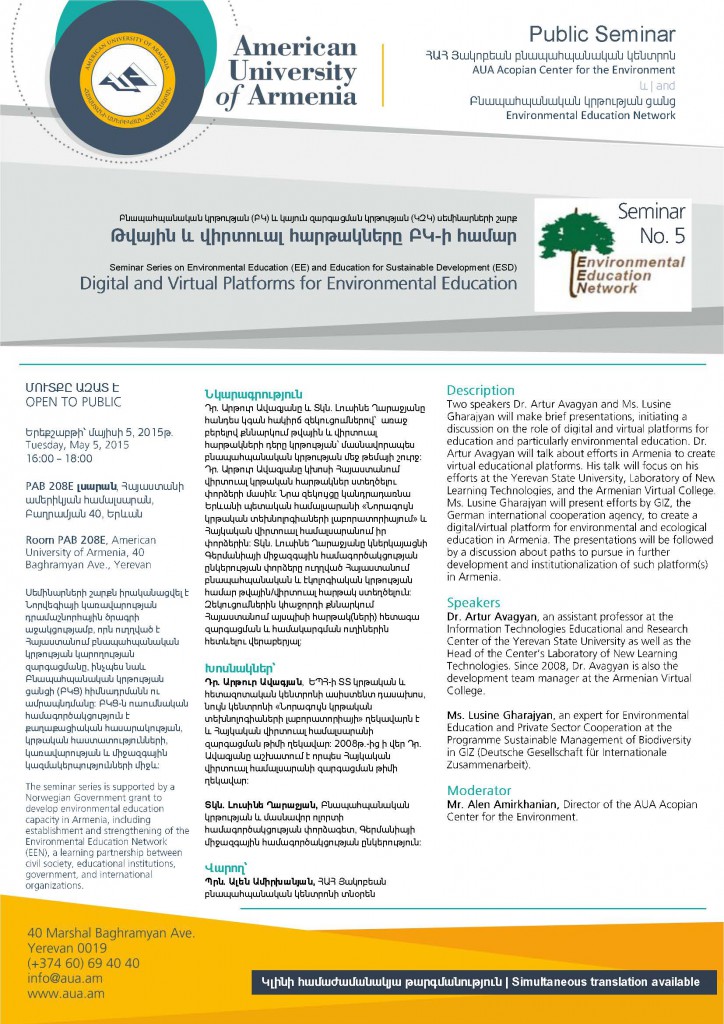
Development 2.0: Social Innovation, Tuesday, April 28, 2015, 12:00 – 1:30 PM
Development 2.0: Social Innovation
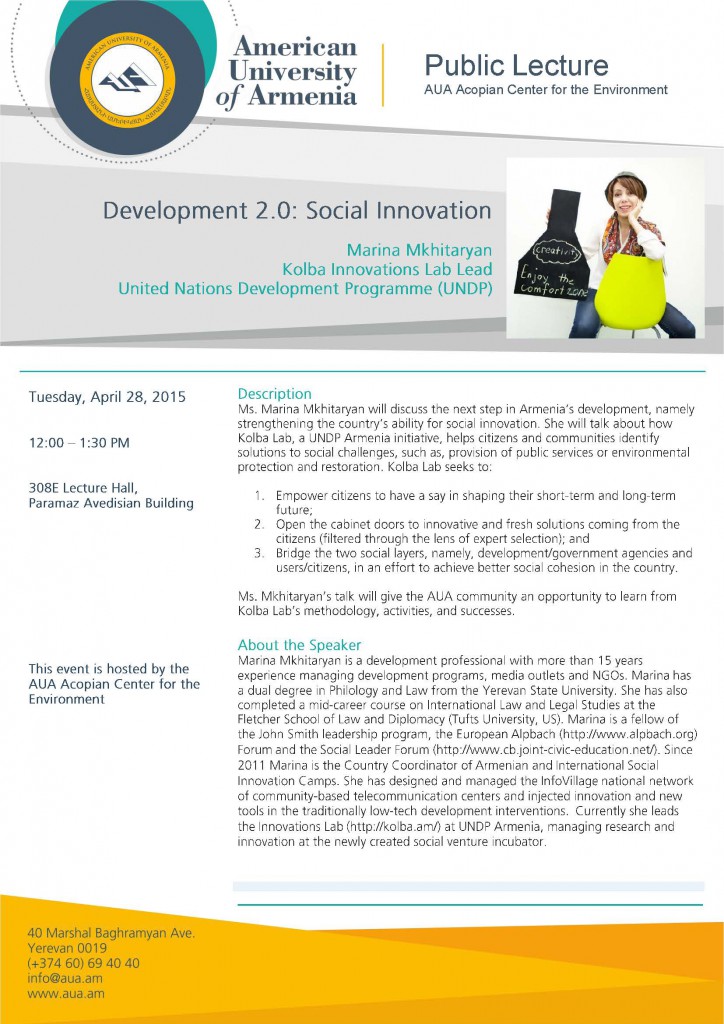
U.S. Innovation & Policy for Clean & Renewable Energy, April 27, 2015, 12:30 pm – 1:30 pm
U.S. Innovation & Policy for Clean & Renewable Energy
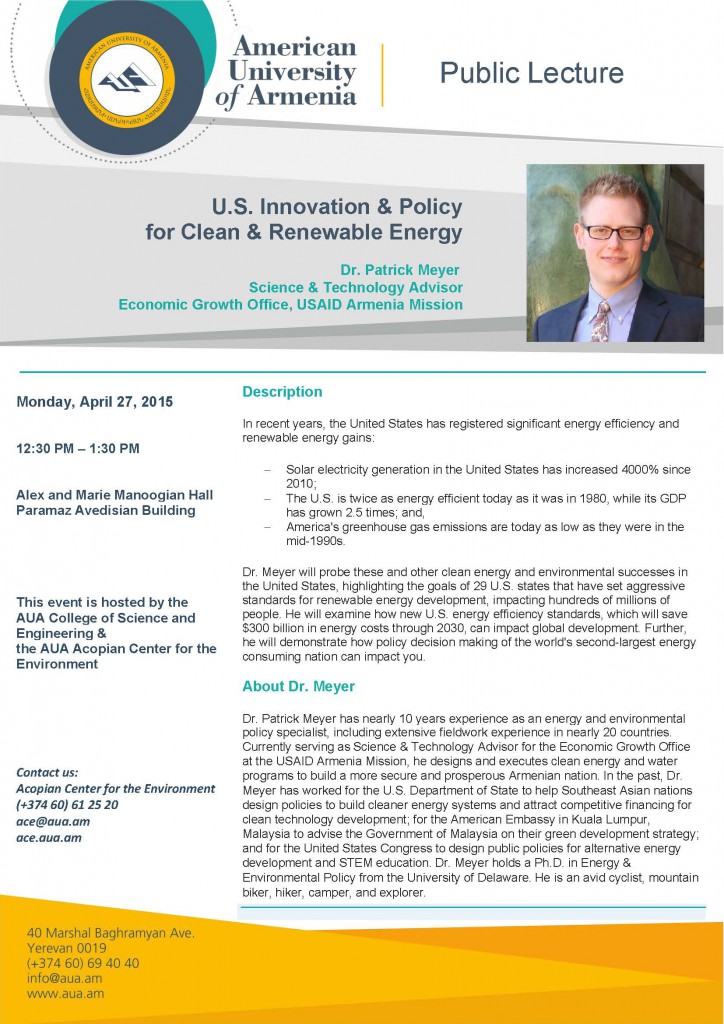
Transforming the Yerevan Zoo, Thursday, April 9, 2015, 12:00 pm – 1:30 pm
Transforming the Yerevan Zoo
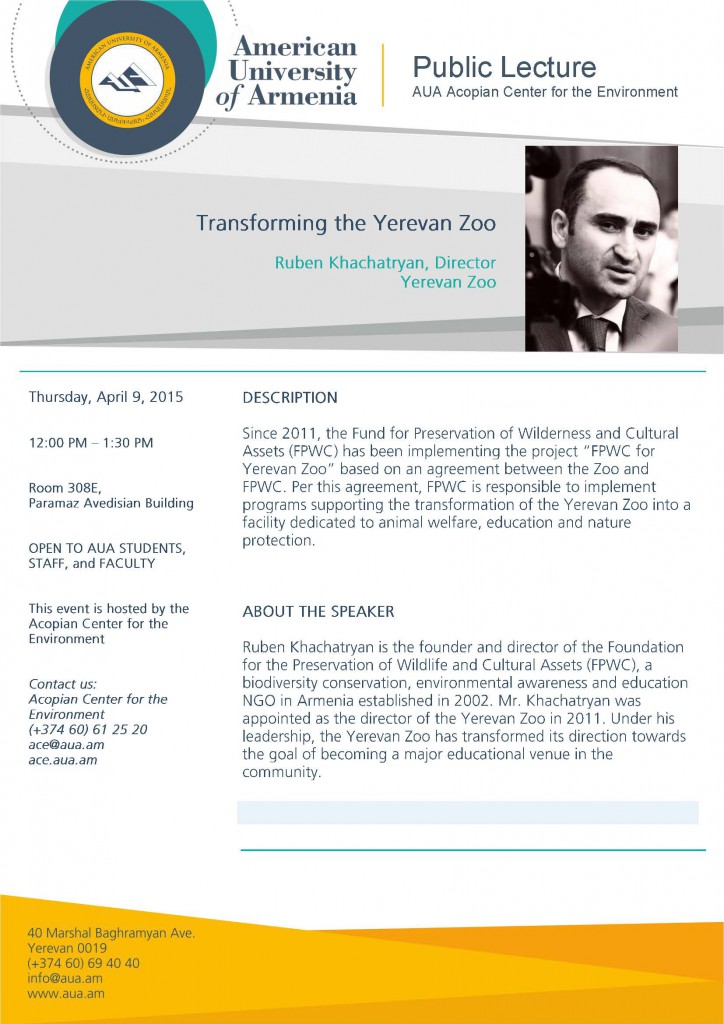
The Role of Civil Society in Environmental Education (EE) and Education for Sustainable Development (ESD)
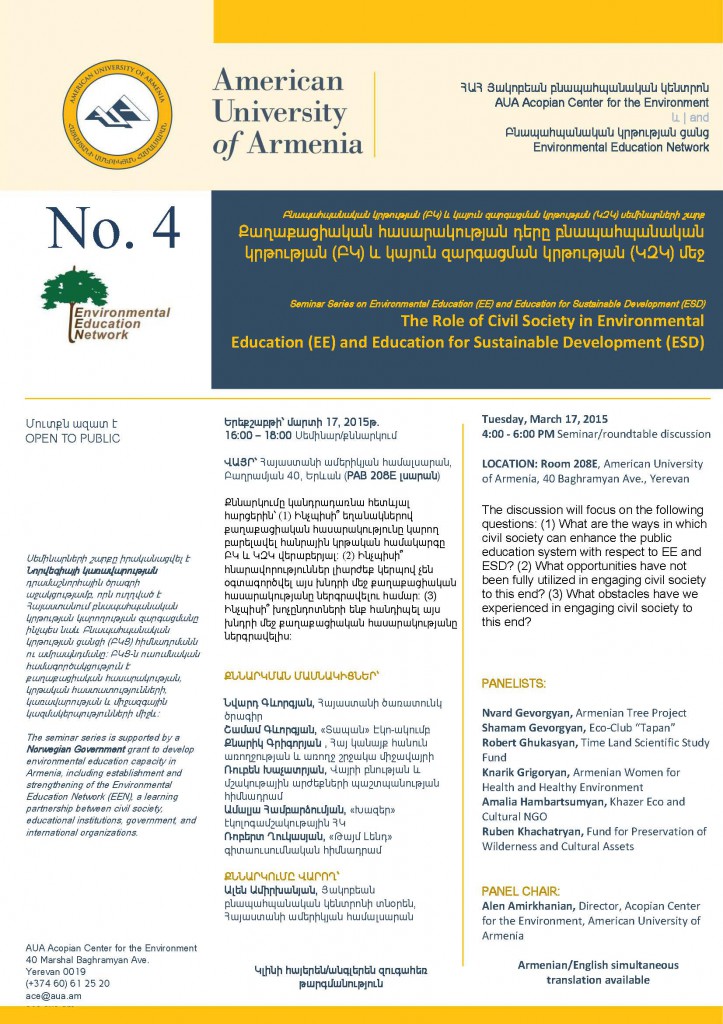
AUA Ecotourism Conference
Seminar Series on Environmental Education (EE) and Education for Sustainable Development (ESD), February – May
Armenia’s International Obligations on Environmental Education (EE) and Education for Sustainable Development (ESD) and Their Implementation
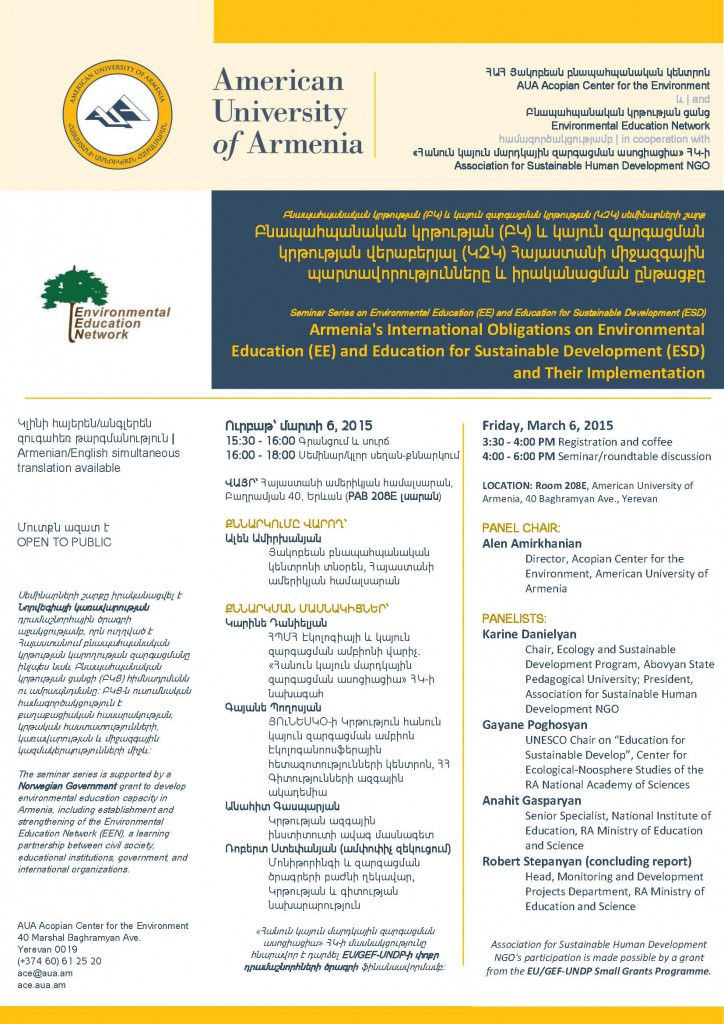
New Video on AUA as an Innovation Force in Armenia!
Environmental Education (EE) and Education for Sustainable Development (ESD) Seminar Series
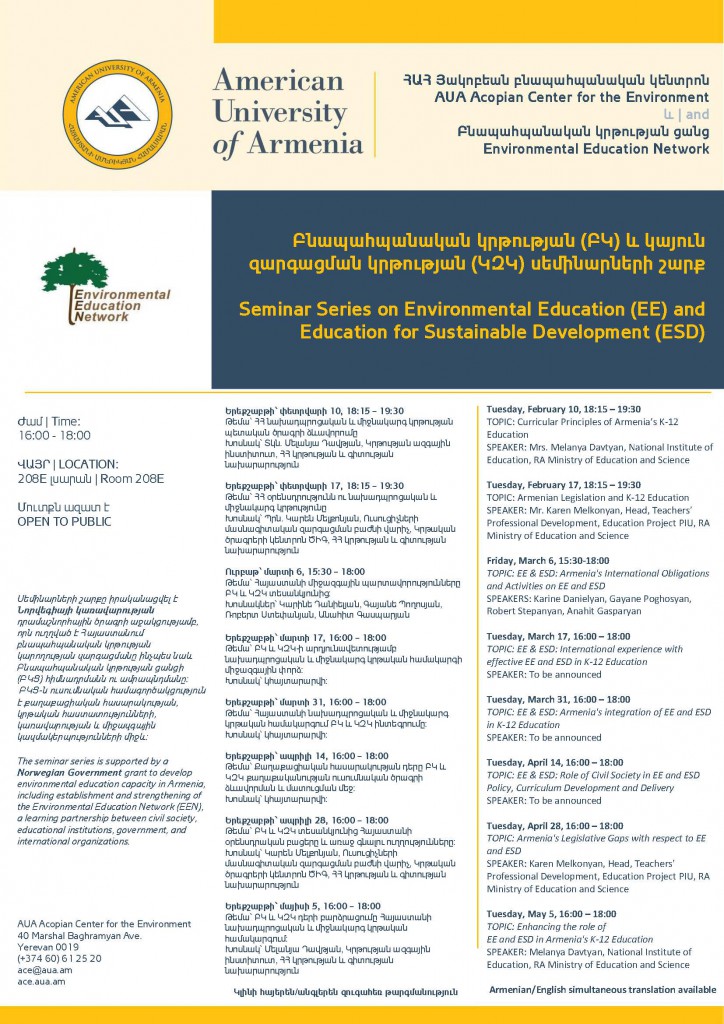
Seminar Series: Armenian Legislation and K-12 Education
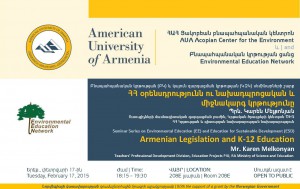
Seminar Series: Curricular Principles of Armenia’s K-12 Education
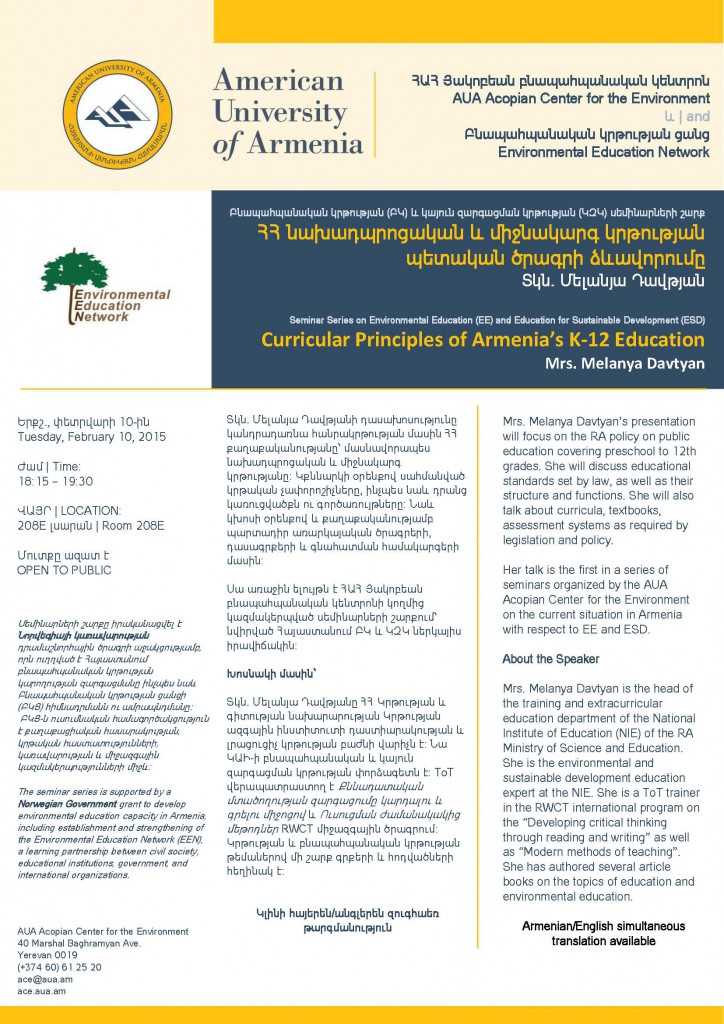
Seminar Series on Environmental Education (EE) and Education for Sustainable Development (ESD): Armenian Legislation and K-12 Education
Opportunities and Restrictions of Sustainable Development of the Aquaculture Sector in Armenia
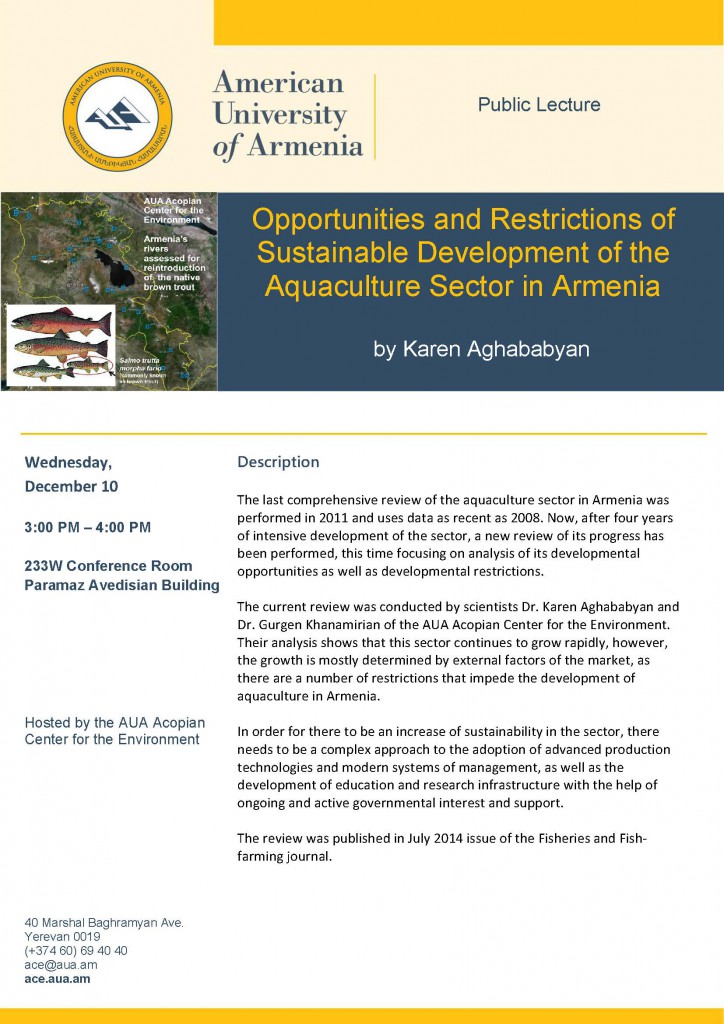
Discussion: Extractive Industries Transparency Initiative (EITI) and Civil Society Organizations
SEMINAR SERIES on Environmental Education (EE) and Education for Sustainable Development (ESD): Curricular Principles of Armenia’s K-12 Education
ENV 202 – ENVIRONMENTAL PROJECTS Undergraduate Course
Starting from this semester AUA is offering a new course called Environmental Projects for undergraduate students.
This upper division course is designed for undergraduate students to gain a deeper understanding and competence in environmental project design, implementation, and evaluation.
The projects can be in technology, science, conservation, management, restoration, promotion or marketing, education, and other related topics.
The course emphasis is on data collection and analysis for assessing the success and impact of project ideas. The students will design and complete a project for the course. The types of environmental projects will vary depending on student and faculty agreement.
The projects may be related to the following topics: Clean technologies; IT, satellite, remote sensing solutions in environmental protection; alternative transport, clean transport; renewable-energy generation or energy efficiency; sustainable water use, solid waste management, sustainable agriculture and food production; mining pollution prevention and management; forest protection, management, and restoration; watershed protection, management, and restoration; air-quality protection, management, and restoration; and flora or fauna monitoring, conservation, and restoration.
